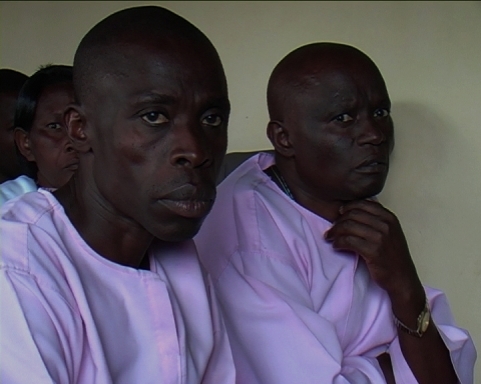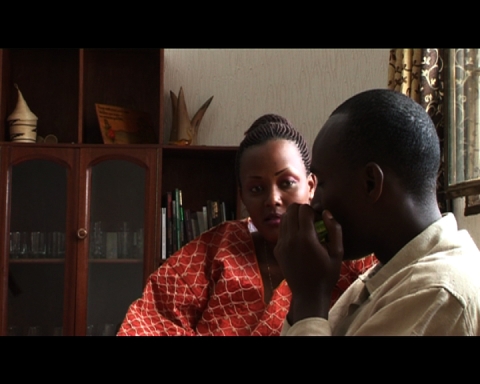– Jean, Sacramento, California 2011
What an amazing film! The video portion of the trial and your questions to the killer of your father was so powerful and brave of you to tape for the world to see. It is raw and real. It is a vivid memory for me and I feel that the individual emotional factor is extremely important for an audience. Unfortunately, it seems that the grand scale of an event is hard overall for people to conceptualize, so the individualizing of the suffering and cognitive factors are powerful in developing
understanding, empathy, and in turn, action for change. So many other parts of your film were moving including the discovery of bodies, the washing of the bones, the burials, the memorial sites, the April memorial and grief.
– An audience member, Silicon Valley, California 2011
The healing of Rwanda is so awesome: how to raise beyond the death. He told us that only God helped him to survive and forgive. I don’t know if I can do that.
– Barbara Waugh, Silicon Valley, California 2011
Your film burst out of the genre of documentary, even the medium of FILM. It’s something else. Like, an experience, a long visit, a… something else. I have felt this way about only one other film “Sophie’s Choice”. You take us somewhere we don’t even want to ever go, and are with us as we take in the unimaginable. thank you so much for what you did with this… I won’t say film.
Gilbert, you are awesome and your film is unforgettable. Your refusal to take easy answers, the impossibility or near impossibility – which is it? for forgiveness – the movie continues to haunt me, in a very good way.
– David Hall, Los Angeles’ Cougar News Staff Writer, 2010
Ndahayo was born during a tragic time within a nation struggling to find its balance of identity. He saw “Hotel Rwanda” in 2009 (almost a decade after its release). The movie was recommended to him by his American grad film student colleagues at Columbia University in the class of 2009.
Appears on picture on the right – is an extracted screen grab from “Rwanda: Beyond The Deadly Pit”. The murderers in Rwanda wear in pink.
“Ndahayo’s film has caused me much soul searching… He had the opportunity to look into the pit that held the remains of family members as well as friends who did not escape the cold blooded reality of murder. President Clinton who was in office during that tragic era, called the Rwandan genocide “one of his worse failures, because I did not intervene.”
– Thierry Durand (French studies Professor, Linfield College, USA)
“The film is about knowing and the impossibility of understanding, the meaning and difficulty of forgiveness and coping. The intensity of the filming also makes it an exemplary account of the suffering of an entire country and its uncertain future… Ndahayo’s technique of superimposition confers a haunting quality that renders in a unique way the feeling of so many survivors. The film immerses us in the gaze of a survivor and his never–ending attempt to deal with loss and trauma. It is an endeavor where filming and editing one’s past becomes an affirmation of one’s survival and voice within the present.”
– Roger Spottiswoode (director of the film based on the memoir of General Romeo Dallaire’s Shake Hands with the Devil)
“Gilbert, you have made a very remarkable film in which you look at yourself as well as your loved ones. You confront your grief with the same clarity as you look at others, you seem to be able to look without blinking, without turning away, whatever the pain… Do you find a need for revenge… Do you ask yourself whether you are supposed to feel forgiveness… “
– R. Z. (Amsterdam, The Netherlands)
“Some movies are too important… Well, this is definitely one of them. I am happy tonight I finally got to watch your movie. And it left me with a lot of questions: Why did it happen? How could people become capable of doing these things (like the guy who said something like “we were not human nor christian. We were like madmen” – then how?)”? What exactly was the role of the French; to what extent are they to be blamed; and what about white people in general? How does Rwanda as a society cope, a society of so many orphans? What happened to the two perpetrators we saw in the gacaca? How could the second one seem too dishonest? Did you find (your) faith again?”
– BATES COLLEGE Newsletter published May 13th, 2008: Rwandan filmmaker to present work about his family, 1994 genocide
“Ndahayo provides a unique perspective… In his filmmaking, Ndahayo has had to bring objectivity to a profoundly personal and traumatic event. He can speak as both a survivor and a documentary maker who has thought critically about the challenges in conveying this story, especially as he meets the people who killed his family.”
– THESSALONIKI DOCUMENTARY FILM FESTIVAL (March 2009): Africa from Within
In this film, Rwandan filmmaker Gilbert Ndahayo faces his own demons and those of his country in an impassioned moment when he faces his father’s killer in the “gacaca” court.
– THESSALONIKI: Conference on Africa
According to Gilbert Ndahayo the first stage of genocide is to say: “People are not people but cockroaches, as the media that was financed by the government said … The most difficult thing was not how to make the film, but how I would go on living after the genocide. At the time people believed that if they ran to churches and monasteries they would be safe. But the murders were waiting for them. They waited for three days until all the people gathered and then they went in, they slaughtered 200 people, threw them in a hole in the ground and lit a fire. Among the murderers were the priests themselves! My parents and my sister were killed by our neighbor.”
I like it (Scars Of My Days) because it’s an individual story and through it the audience can know the reality of a group.
And I’m grateful to you because I know a part of regular life in Rwanda and not just about an exceptional point in history, you has told me something new about your country. And I think we should learn to pay attention to little facts in every day life, because it’s that which lead to big situations.

